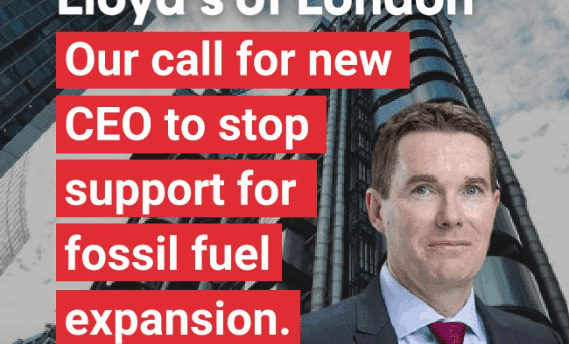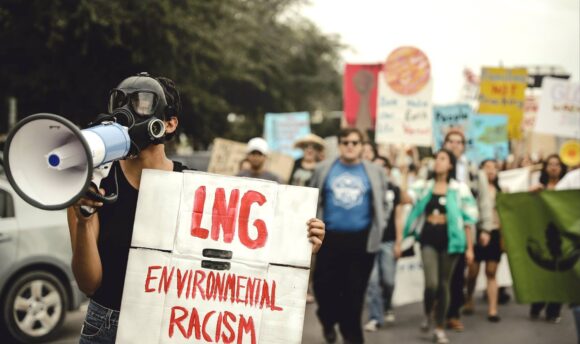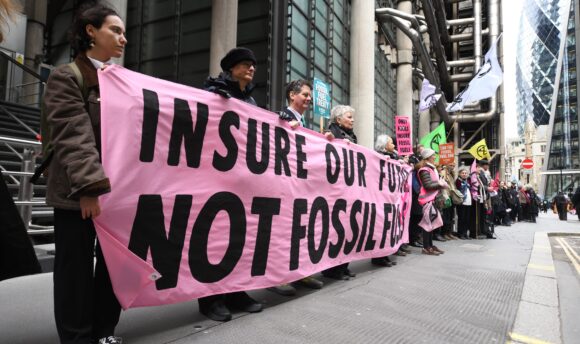Nearly 100 civil society organizations working to advance human rights and environmental justice sent a letter to the Chairman and CEO of Lloyd’s of London asking that they tell their members not to provide (re)insurance coverage for the East African Crude Oil Pipeline (EACOP) project.
Citing a range of severe risks and controversies surrounding the project, and Lloyd’s failure to respond to earlier correspondence from the #StopEACOP campaign, the signatories are requesting a meeting with Lloyd’s to discuss the project risks in more detail.
By releasing this letter publicly, #StopEACOP aims to pressure Lloyd’s to meet with them and to join other major multinational (re)insurers’ Zurich, AXA, Swiss Re, SCOR and Hannover Re in taking a clear position against EACOP.
—
Dear Mr. Carnegie-Brown and Mr. Neal,
I am writing on behalf of the #StopEACOP campaign in relation to Lloyd’s of London’s potential support for the East African Crude Oil Pipeline (EACOP), a proposed 1,443-kilometer oil pipeline in Uganda and Tanzania. We believe that Lloyd’s members are likely to be approached for (re)insurance coverage for the pipeline.
Campaign members previously reached out to your colleagues Mr. Sansom and Mr. Khilosia in November 2020 and August 2021 to provide a finance risk briefing and updated briefing on the EACOP. Unfortunately, we received no response. We are now following up with a third update to the risk briefing, dated February of this year. You can find the 2022 update attached. We highly recommend reviewing all three documents in order to gain a full understanding of the range of severe risks and controversies surrounding the EACOP project.
Here is a high-level overview of the project’s key environmental and social risks:
If built, the EACOP will be the longest electrically heated pipeline in the world. The pipeline and associated oil extraction projects will impact the land of over 100,000 individuals in Uganda and Tanzania, threatening communities that rely on farming for their livelihoods and for survival. Thousands of project-affected families are already facing food insecurity, having been deprived of the use of their land to produce food and cash crops for several years without any compensation.
The project poses extensive threats to one of the world’s most ecologically diverse regions, and the communities who rely on it: the pipeline would disrupt nearly 2,000 square kilometres of protected wildlife habitats critical to the preservation of vulnerable species like the Eastern Chimpanzee and the African Elephant. It threatens Lake Victoria, a critical freshwater source for more than 40 million people, and Lake Albert, the single largest contributor to Uganda’s fishing industry. The upstream component entails drilling 130 oil wells within Uganda’s largest and oldest protected nature reserve, Murchison Falls National Park, a Ramsar site which hosts numerous endangered species and is relied upon by over one million people for fishing and water supplies. An oil spill or leak would have catastrophic and irreversible effects on these vital resources. Expert technical reviews of the project have found that the TotalEnergies and CNOOC have failed to employ the ‘Best Available Technique’ to minimize risks to these critical resources, opting instead for high-risk and low-cost designs.
The project poses immense climate risks: the oil transported by EACOP is expected to release an estimated 34.3 million metric tons of CO2 per year, significantly greater than the current annual emissions of Uganda and Tanzania combined.
These risks and impacts are occurring in a high-risk context with an increasingly restricted civic space, in which local communities are not able to safely express their views in relation to the project. Local civil society actors and community leaders have faced intensifying harassment, intimidation, reprisals and arrests for speaking out in defense of their rights – including as recently as this past February – garnering attention from multiple UN Special Rapporteurs.
Many of these human rights, environmental and climate risks are inherent to the project design and purpose, making them impossible to adequately mitigate even if the project sponsors, Total and CNOOC, were to abide by international best practice – which they have failed to do thus far.
As such, the project has faced intense local and transnational resistance, with over one million people having signed a petition against the project. The project faces legal challenges at the national, regional and international levels, including in French courts and at the East African Court of Justice. This includes a case at the East African court of justice as well as the first case under the duty of vigilance law in the French courts.
At the time of writing, five major multinational (re)insurers, Zurich, AXA, Swiss Re, SCOR and Hannover Re have stated that they will not insure the project. Fifteen major commercial banks from Europe, Japan, Australia and South Africa have publicly stated that they will not participate in the $3 billion project loan needed for the pipeline to reach financial close. The UK export credit agency, UKEF, and the African Development Bank have similarly refused support for the project. This reluctance among potential financiers and insurers has reportedly driven up the project’s cost by roughly 30%, from $3.5 billion to $5 billion. It has also fostered significant controversy, creating immense reputational risk for any institution that chooses to support the EACOP.
The #StopEACOP Campaign calls upon Lloyd’s to advise its members against participation in (re)insurance coverage for the East African Crude Oil Pipeline and associated oil projects. We urge Lloyd’s members to instead support sustainable and rights-respecting alternative development opportunities in the region.
We welcome the opportunity to discuss this further in a virtual meeting and look forward to receiving your response by April 18th, 2022. Please direct any responses to Omar Elmawi at info@stopeacop.net and Coleen Scott at coleen@inclusivedevelopment.net.
Regards,
Omar Elmawi
Coordinator of #StopEACOP



